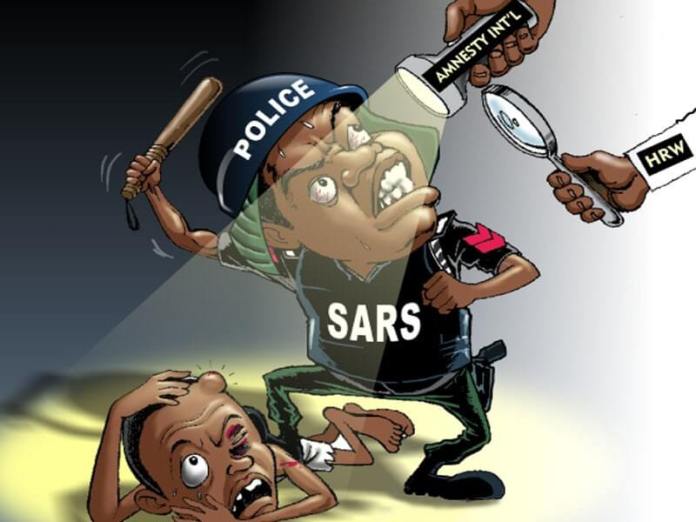Human Rights and The Revolt Against SARS…

Following an alleged anti-judicial killing in Lagos of a young man by some operatives of the notorious Special Anti-Robbery Squad (SARS), there were uproars in the social media last week with many Nigerians recounting tales of brutality in the hands of the men who ordinarily should shield them from harm’s way. From Port Harcourt to Oyo to Enugu to Abuja to Kano and Maiduguri, it would seem that the officers and men of SARS have become law unto themselves. So horrific were the testimonies (some of them with video evidence) that the Inspector General of Police, Mr Ibrahim Idris, had to intervene by instituting a reform to reorganise the unit.
However, as we join the rest of the world to mark the international human rights day, it is important to highlight that the defining paradox of Nigeria’s unenviable human rights record is that the greatest violations are committed in the name of security. Even before the SARS revelations, most of the cases of abuse that have been reported and documented by Amnesty International have been linked to security and law enforcement operatives in the line of duty. The police and the military have been reported to carry out extra judicial killings, torture or rape, most often to humiliate citizens.
In all civilised societies, mere suspicion does not constitute an offence or grounds for inflicting punishments. Persons accused of any crime are charged to court if not for anything, at least to avoid a miscarriage of justice. But on the basis of unproven allegations, sometimes without any allegation at all, personnel of our law enforcement agencies would subject innocent citizens to all manner of molestations. For instance, the scale of public reactions and the evidences being provided by those who have encountered the brutalities of SARS, according to the Country Director of Amnesty International, Mr Osai Ojigho, revealed very clearly “that the concerns of the Nigerian people are reaching boiling point,” adding that “all incidents of violence meted out by this notorious police unit must be independently investigated, and those found to be responsible must be prosecuted in fair trials.”
Unfortunately, the challenge of human rights abuse in Nigeria goes beyond the police as an institution or SARS as a unit. In recent times, women who escaped from the barbarism of Boko Haram to seek protection from security forces have reported even worse abuse in the hands of Nigerian soldiers. The fight against terrorism in the Northeast has provided an alibi for soldiers to carry out extra judicial killings because they were without recourse to either the accepted rules of warfare or the rule of law.
In the Southeast, recent onslaughts against the renegade Indigenous People of Biafra (IPOB) resulted in fatalities. Incidentally, this weekend marks the second year anniversary of the killings, in Kaduna by soldiers, of hundreds of Shiites Movement members. Their leader, Sheikh Ibrahim el-Zakzaky and his wife are still in incarceration. In the Niger Delta, whole communities have been sacked or traumatised in the name of security by soldiers who are often ill-trained and hardly could differentiate armed militants from innocent bystanders.
The root of these human rights violations is an embarrassing ignorance on the part of security operatives of the basic rights of citizens in a democratic society. Correspondingly, we are often dealing with a rank and file who themselves do not understand their obligations in the protection of fellow citizens and their basic rights. Aside all these, elected governments that routinely adopt abusive policies cannot be trusted to protect people from abuses by operatives of state.
Interestingly, fellow Nigerians empathize with each other when in distress and largely respect each other’s basic rights and dignity. But when the armed agents of the state come into the picture, a hostile relationship also comes into play. At other times, politicians sow hatred among peaceful neighbours by inviting armed agents of state to unleash violence. So, either as politicians or practitioners of organised violence, the state is the biggest source of concern in human rights abuses in Nigeria today.
It is important to highlight that the defining paradox of Nigeria’s unenviable human rights record is that the greatest violations are committed in the name of security
